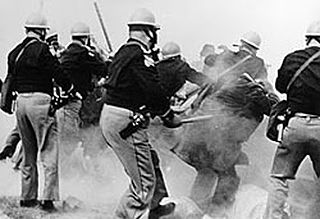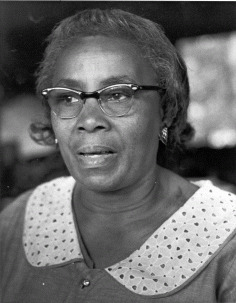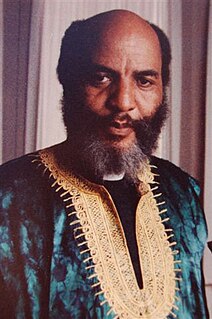Related Research Articles

The 1954–1968 civil rights movement in the United States was preceded by a decades-long campaign by African Americans and their like-minded allies to end legalized racial discrimination, disenfranchisement and racial segregation in the United States. The movement has its origins in the Reconstruction era during the late 19th century, although it made its largest legislative gains in the mid-1960s after years of direct actions and grassroots protests. The social movement's major nonviolent resistance and civil disobedience campaigns eventually secured new protections in federal law for the human rights of all Americans.

The Student Nonviolent Coordinating Committee was the principal channel of student commitment in the United States to the civil rights movement during the 1960s. Emerging in 1960 from the student-led sit-ins at segregated lunch counters in Greensboro, North Carolina, and Nashville, Tennessee, the Committee sought to coordinate and assist direct-action challenges to the civic segregation and political exclusion of African Americans. From 1962, with the support of the Voter Education Project, SNCC committed to the registration and mobilization of black voters in the Deep South. Affiliates such as the Mississippi Freedom Democratic Party and the Lowndes County Freedom Organization in Alabama also worked to increase the pressure on federal and state government to enforce constitutional protections.

Kwame Ture was a prominent organizer in the civil rights movement in the United States and the global Pan-African movement. Born in Trinidad, he grew up in the United States from the age of 11 and became an activist while attending the Bronx High School of Science. He was a key leader in the development of the Black Power movement, first while leading the Student Nonviolent Coordinating Committee (SNCC), then as the "Honorary Prime Minister" of the Black Panther Party (BPP), and last as a leader of the All-African People's Revolutionary Party (A-APRP).

The Southern Christian Leadership Conference (SCLC) is an African-American civil rights organization. SCLC is closely associated with its first president, Martin Luther King Jr., who had a large role in the American civil rights movement.

The Selma to Montgomery marches were three protest marches, held in 1965, along the 54-mile (87 km) highway from Selma, Alabama, to the state capital of Montgomery. The marches were organized by nonviolent activists to demonstrate the desire of African-American citizens to exercise their constitutional right to vote, in defiance of segregationist repression; they were part of a broader voting rights movement underway in Selma and throughout the American South. By highlighting racial injustice, they contributed to passage that year of the Voting Rights Act, a landmark federal achievement of the civil rights movement.

Ella Josephine Baker was an African-American civil rights and human rights activist. She was a largely behind-the-scenes organizer whose career spanned more than five decades. In New York City and the South, she worked alongside some of the most noted civil rights leaders of the 20th century, including W. E. B. Du Bois, Thurgood Marshall, A. Philip Randolph, and Martin Luther King Jr. She also mentored many emerging activists, such as Diane Nash, Stokely Carmichael, and Bob Moses, as leaders in the Student Nonviolent Coordinating Committee (SNCC).

Robert Parris Moses was an American educator and civil rights activist, known for his work as a leader of the Student Nonviolent Coordinating Committee (SNCC) on voter education and registration in Mississippi during the Civil Rights Movement, and his co-founding of the Mississippi Freedom Democratic Party. As part of his work with the Council of Federated Organizations (COFO), a coalition of the Mississippi branches of the four major civil rights organizations, he was the main organizer for the Freedom Summer Project.

Septima Poinsette Clark was an African American educator and civil rights activist. Clark developed the literacy and citizenship workshops that played an important role in the drive for voting rights and civil rights for African Americans in the Civil Rights Movement. Septima Clark's work was commonly under-appreciated by Southern male activists. She became known as the "Queen mother" or "Grandmother" of the Civil Rights Movement in the United States. Martin Luther King Jr. commonly referred to Clark as "The Mother of the Movement". Clark's argument for her position in the Civil Rights Movement was one that claimed "knowledge could empower marginalized groups in ways that formal legal equality couldn't."

The Poor People's Campaign, or Poor People's March on Washington, was a 1968 effort to gain economic justice for poor people in the United States. It was organized by Martin Luther King Jr. and the Southern Christian Leadership Conference (SCLC), and carried out under the leadership of Ralph Abernathy in the wake of King's assassination in April 1968.
Operation Breadbasket was an organization dedicated to improving the economic conditions of black communities across the United States of America.

James Luther Bevel was a minister and a leader of the Civil Rights Movement in the United States. As the Director of Direct Action and of Nonviolent Education of the Southern Christian Leadership Conference (SCLC), he initiated, strategized, directed, and developed SCLC's three major successes of the era: the 1963 Birmingham Children's Crusade, the 1965 Selma voting rights movement, and the 1966 Chicago open housing movement. He suggested that SCLC call for and join a March on Washington in 1963. Bevel strategized the 1965 Selma to Montgomery marches, which contributed to Congressional passage of the 1965 Voting Rights Act.
The Chicago Freedom Movement, also known as the Chicago open housing movement, was led by Martin Luther King Jr., James Bevel and Al Raby. It was supported by the Chicago-based Coordinating Council of Community Organizations (CCCO) and the Southern Christian Leadership Conference (SCLC). The movement included a large rally, marches, and demands to the City of Chicago. These specific demands covered a wide range of areas besides open housing, and included quality education, transportation and job access, income and employment, health, wealth generation, crime and the criminal justice system, community development, tenants rights, and quality of life. Operation Breadbasket, in part led by Jesse Jackson, sought to harness African-American consumer power. The Chicago Freedom Movement was the most ambitious civil rights campaign in the North of the United States, lasted from mid-1965 to August 1966, and is largely credited with inspiring the 1968 Fair Housing Act.
The Council of Federated Organizations (COFO) was a coalition of the major Civil Rights Movement organizations operating in Mississippi. COFO was formed in 1961 to coordinate and unite voter registration and other civil rights activities in the state and oversee the distribution of funds from the Voter Education Project. It was instrumental in forming the Mississippi Freedom Democratic Party. COFO member organizations included the National Association for the Advancement of Colored People.
Voter Education Project (VEP) raised and distributed foundation funds to civil rights organizations for voter education and registration work in the southern United States from 1962 to 1992. The project was federally endorsed by the Kennedy administration in hopes that the organizations of the ongoing Civil Rights Movement would shift their focus away from demonstrations and more towards the support of voter registration.
The Summer Community Organization and Political Education (SCOPE) Project of the Southern Christian Leadership Conference (SCLC) was a voter registration civil rights initiative conducted from 1965 to 1966 in 120 counties in six southern states. The goal was to recruit white college students to help prepare African Americans for voting and to maintain pressure on Congress to pass what became the Voting Rights Act of 1965. Dr. Martin Luther King announced the project at UCLA in April 1965, and other leaders recruited students nationwide.
Dorothy Cotton was an American civil rights activist, who was a leader in the Civil Rights Movement in the United States and a member of the inner-circle of one of its main organizations, the Southern Christian Leadership Conference (SCLC). As the SCLC's Educational Director, she was arguably the highest ranked female member of the organization.

The National Association for the Advancement of Colored People (NAACP) is a civil rights organization in the United States, formed in 1909 as an interracial endeavor to advance justice for African Americans by a group including W. E. B. Du Bois, Mary White Ovington, Moorfield Storey and Ida B. Wells.
This is a timeline of the 1947 to 1968 civil rights movement in the United States, a nonviolent mid-20th century freedom movement to gain legal equality and the enforcement of constitutional rights for People of Color. The goals of the movement included securing equal protection under the law, ending legally established racial discrimination, and gaining equal access to public facilities, education reform, fair housing, and the ability to vote.
The Dallas County Voters League (DCVL) was a local organization in Dallas County, Alabama, which contains the city of Selma, that sought to register black voters during the late 1950s and early 1960s.

African-American women played a variety of important roles in the civil rights movement. They were leaders, demonstrators, organisers, fundraisers and theorists. For them, this was a continuation of the previous work African-American women had put in to fight inequality, as seen in the fight for universal suffrage, anti-lynching laws, full employment and anti-Jim crow laws. African-American women were positioned between two struggles, both sexism and racism. African-American women paid attention to the ways in which race, gender and class interlinked, and fought for equality across all categories. Some historians have argued that the women's liberation movement was born out of African-American women's work towards gender equality as part of their civil rights activism.
References
- ↑ Morris, Aldon D. (1986). "The SCLCs Crusade for Citizenship". The Origins of the Civil Rights Movement. Simon and Schuster. pp. 100–119. ISBN 9780029221303.